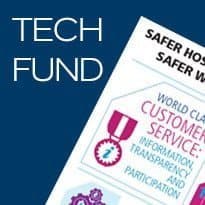Treasury releases tech fund money
- 4 March 2014

The Treasury has approved funding for the second tranche of projects in the first round of the ‘Safer Hospitals, Safer Wards: Technology Fund’.
Paul Rice, NHS England’s head of technology strategy, told EHI today that trusts will be notified that the approval means they can draw down the money from the start of April 2014.
The tech fund was set up to support health secretary Jeremy Hunt’s call for a ‘paperless’ NHS, and was announced as two separate sums of money.
Trusts had limited time to submit bids for the first, £260m fund, some £90m of which must be spent by the start of the next financial year.
NHS England announced that it had approved £218m for 234 projects from this fund in December. However, EHI reported last week that several winning trusts had to resubmit their value for money cases and were still awaiting Treasury approval.
Some of the money held up by the Treasury comes from the £90m of public dividend capital funding that must be spent before the end of the 2013-14 financial year under Department of Health rules.
This means that approved projects, with part of their spend budgeted for this financial year, will have to be funded by money earmarked for another financial year.
Speaking at the Health and Social Care Innovation Expo in Manchester, Rice said he did not know the exact final figures, but estimated that about half of the £90m would make its way to successful organisations.
Rice said the knock-on effect of this needs to be determined and is part of rolling negotiations with the Treasury. However, £50m of the £260m has not been committed.
This was going to be rolled into ‘tech fund 2’, taking it to £300m. But Rice said the value of the second tech fund is now likely to be what Hunt originally said it would be – £250m.
Rice also said he expects the total investment in NHS IT via the two technology funds to be "north of £500m" which, with matched funding, will exceed the £1 billion investment promised by Hunt in September last year.
EHI reported last month that because of the tight timescales, NHS trusts involved in the first round of bidding can claim funding retrospectively for any project spend since April 2013.
To be approved, the trusts need to show a value for money of more than 1 for e-prescribing projects, higher than 1.5 for digital records projects, and at least 2.4 for the rest.
The first round of bidding attracted 760 applications totalling £650m, and focused on four key areas: adoption of the NHS Number as the primary patient identifier; integrated digital care records including information sharing within and between organisations; e-prescribing; and advanced scheduling.
The prospectus for the second tech fund is due out at the end of the month and is expected to have an “exciting” new name.
Rice told EHI last month that the information provided to trusts for the second round of bidding will be much more detailed than the packs that accompanied the first round.
Trusts are also likely to face tougher requirements in terms of following an IT roadmap, national architecture and standards, but they will have three months to apply.
“We intend to send out a comprehensive pack with all the materials in advance, including MoU documentation and samples of what good looked like the first time around,” Rice said.




